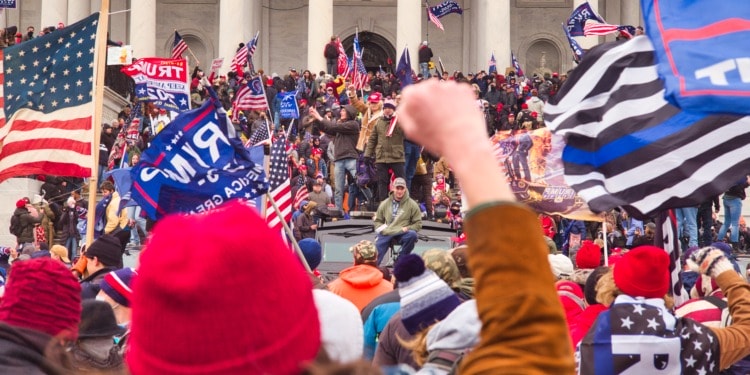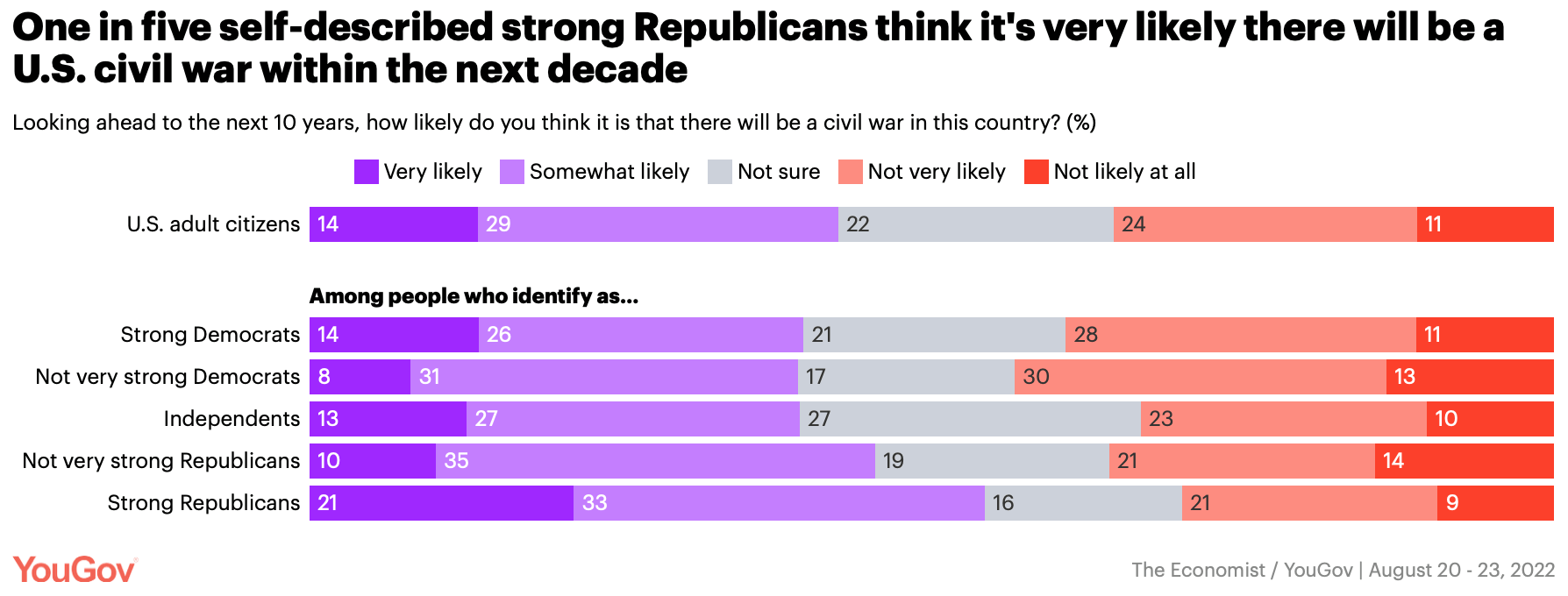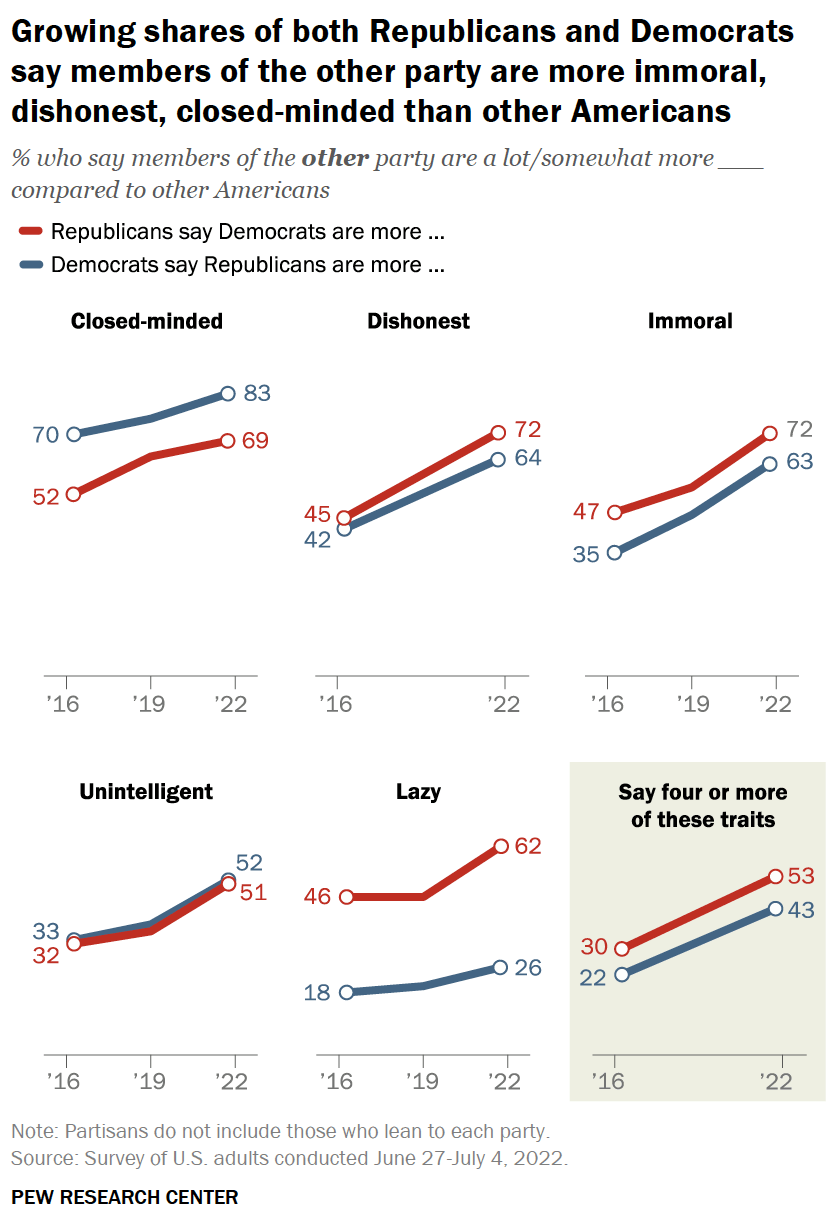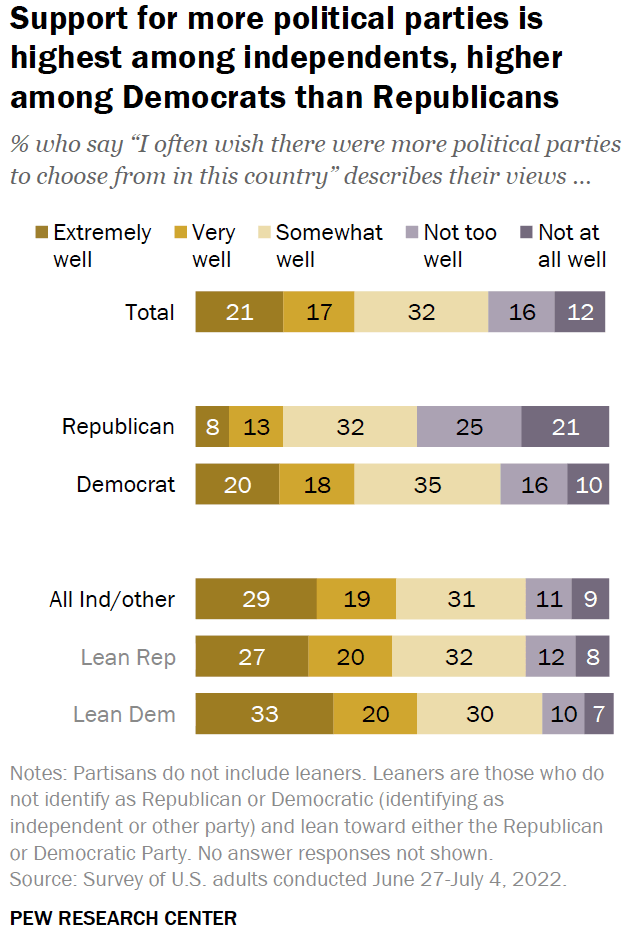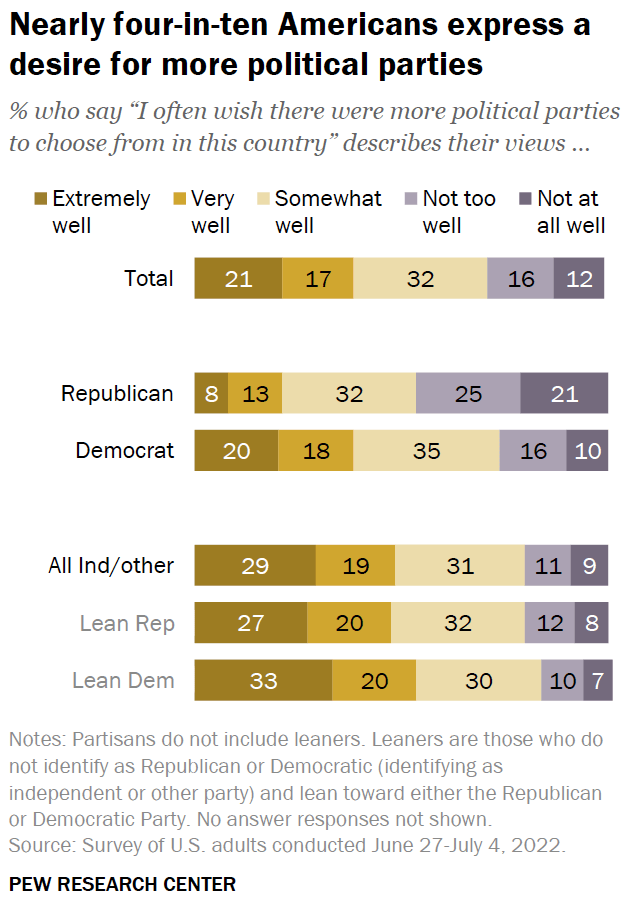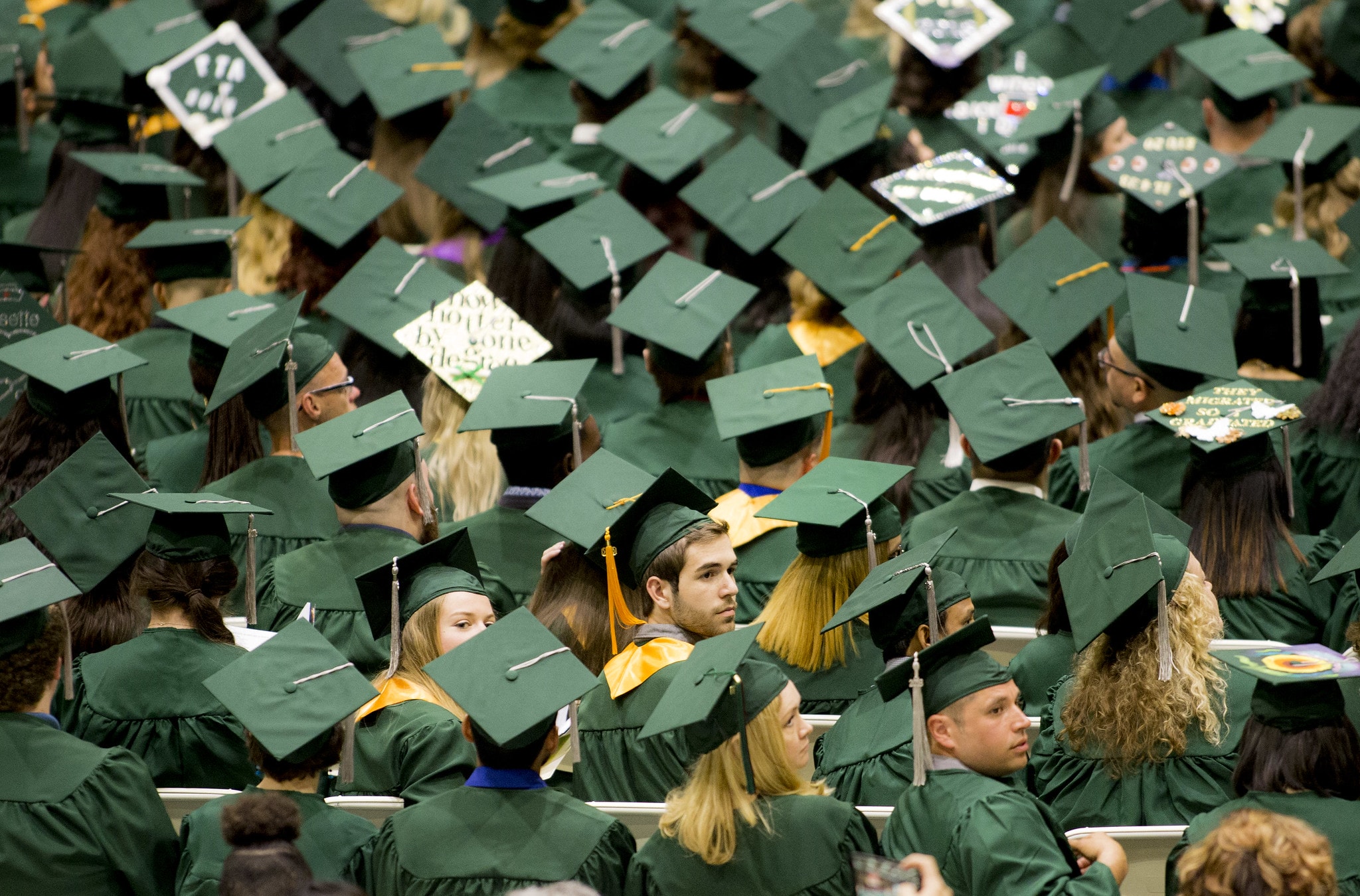A recent survey by the Economist and YouGov asked 1,500 adult US citizens about changes in the political environment in their country. According to its findings, most Americans (66%) feel that divisions have worsened since the beginning of 2021 and most (63%) anticipate them to worsen further in the coming years.
Only 8% of surveyed Americans feel that the country’s political divides have improved since early 2021.

The poll also found that two in five people in the United States (43%) think a civil war is at least somewhat likely to break out in the coming decade while 14% find it to be very likely; about 35% think civil war is not very or at all likely and the remaining 22% said they are unsure.
Two in five Americans say a civil war is at least somewhat likely in the next decade.https://t.co/Q8GbwMlr5b pic.twitter.com/FxO7vDlOMb
— YouGov America (@YouGovAmerica) August 29, 2022
Unsurprisingly, Republicans find civil war in the next decade more likely than Democrats, particularly those who identify as “strong Republicans” – 21% of whom feel civil war is highly likely in the next ten years, compared to fewer than 15% of each of the other four political groupings surveyed (including “not very strong Republicans”).
Alongside political division, the Economist and YouGov journalists and researchers found that 65% of American people also believe that political violence has been on the rise since the Capitol riot on January 6, 2021, when Trump’s supporters, urged to “fight like hell,” attempted to prevent the certification of the election results. They also revealed that 62% of Americans believe political violence will escalate further over the next several years.
 Meanwhile, only 9% of surveyed Americans believe political violence will decrease in the future.
Meanwhile, only 9% of surveyed Americans believe political violence will decrease in the future.
Role of gun violence
Studies from the National Institute for Health Care Management (NIHCM) found that between 2010 and 2020, firearm fatalities in the US increased by roughly 43%; the coronavirus pandemic, according to NIHCM, has resulted in a spike in gun purchases.
Garen Wintemute, a gun violence researcher at the University of California, surveyed more than 8,600 adults about their views on democracy in the US, racial attitudes in American society and their own attitudes toward political violence. A strong leader is more crucial, according to around 40% of respondents, even though virtually all agreed that it is necessary for the United States to remain democratic.
Related Articles: How Gun Violence Damages America’s Image | The COVID-19 Pandemic and the impact on violence
About one in five respondents believe they would likely be carrying a gun if they were caught in a scenario where they felt justified to use violence to further a significant political goal. A little more than 7% of participants (which would correspond to around 18 million Americans) said they would be prepared to kill a person in such a circumstance.
Is the American electoral system to blame?
All political groups in America, according to a Pew Research Centre survey, show many indications of negativity toward the Two-Party System.
Nearly half of younger adults in the US say they “wish there were more parties to choose from.”
Republicans and Democrats disagree on many issues, a divide that has contributed to the rising number of people across both parties now believing that members of the other party are more narrow-minded, dishonest, immoral, and ignorant than the average American.
The extent to which members of the opposite party are considered immoral may be the most notable development. The Americans who identify as politically independent are left with no other option within the Two-Party system.
In 2016, slightly more than a third of Democrats (35%) and about half of Republicans (47%) said that members of the other party were much or somewhat more immoral than the general population. Currently, 63% of Democrats and 72% of Republicans believe that members of the opposite party are more immoral than the rest of Americans, as claimed by the Pew Research Centre’s survey of 6,174 US adults conducted on June 27-July 4, 2022.
The survey also found that 39% of the general population agree that the statement “I often wish there were more political parties to select from in our country” fits their opinions extremely or very well. Another 32% claim that the phrase accurately captures their viewpoints in some way, while 28% claim that it does not adequately or at all capture their viewpoints.
Another key finding is that Democrats are more likely than Republicans to indicate they would want to see additional political parties: 38% of Democratic Party members say this represents their beliefs extremely or very well, compared to 21% of Republicans.
However, the sentiment is strongest among independents and those who do not identify with a party: 48% of such respondents feel the statement accurately sums up their opinions.
Each age group also has a different level of preference for the number of political parties available in the US. The overall interest in having more political parties is higher amongst younger Americans (47% for ages 18 to 49) than older adults (35% for ages 50 to 64), the Pew survey finds.
Overall, just under 40% of American citizens say they wish there were more political parties.
Public opinion does not favour either party very much: The Democratic Party is viewed favourably by almost four in ten Americans (41%), while fewer (37%) view the Republican Party as favourable.
The percentage of Americans who find neither of the two parties favourable has been on the rise since the 1990s. As Director of Political Research at Pew Research Center Carroll Doherty points out in his tweet below, it has never been higher than it is today, when 27% of Americans find both parties unfavourable.
NEW Even as partisan polarization grows, there is frustration w/ the 2-party system:
27% view now both parties unfavorably; was less than 10% in mid-1990s.
Young adults, in particular, say they wish 'there were more political parties to choose from.'https://t.co/amk5VseznA pic.twitter.com/mKWRw3qoBo— Carroll Doherty (@CarrollDoherty) August 9, 2022
Independents who lean Democratic have now boosted their support for this from 50% to 61%, while those who lean Republican increased their support from 39% to 57%. Republicans’ and Democrats’ opinions have not altered too much throughout that time period.
As the Economist and YouGov survey revealed, there is little doubt that the perception of political polarisation in the US has grown since 2021, and that these divides are considered to be expanding by Americans. While this is distinct from thinking that the nation’s divisions will lead to conflict and civil war, a lot of Americans believe that such a confrontation is inevitable.
Editor’s Note: The opinions expressed here by the authors are their own, not those of Impakter.com — In the Featured Photo: Trump supporters storming the US capitol on 6 January 6, 2021. Featured Photo Credit: Brett Davis.


